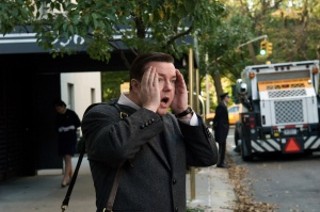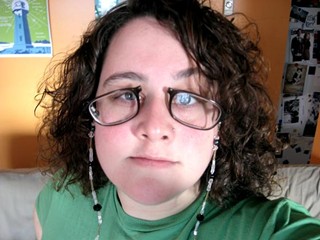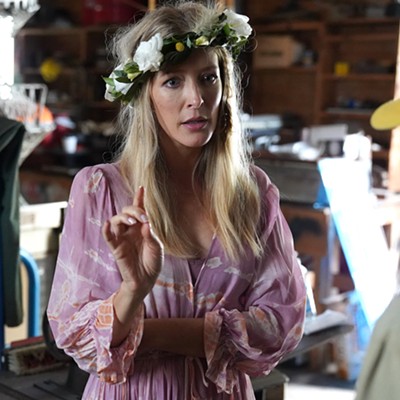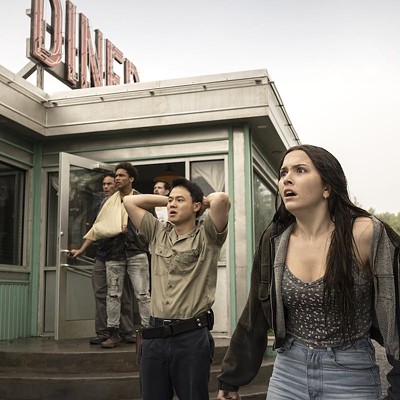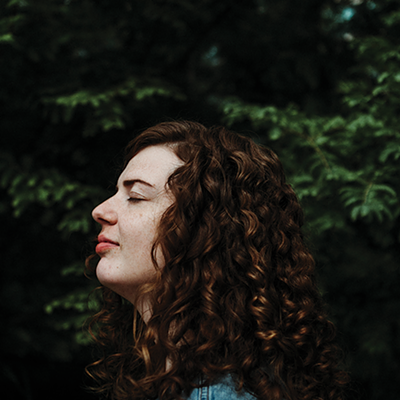"He had three rules going into it," says director David Koepp of his Ghost Town star Ricky Gervais. "The first rule was 'I won't kiss anybody, nobody wants to see that.' Second rule was 'I won't talk to myself alone in a room no matter how much it helps the plot. And I will ruin takes by laughing.'"
Gervais's first film role has him mining territory familiar to fans of the original The Office and Extras, where he portrayed awkward social malcontents. In Ghost Town he's Bertram Pincus, a dentist who dies for seven minutes during a colonoscopy ("I died?!" "A little bit," shrugs his surgeon, Saturday Night Live's utility player Kristen Wiig) and finds himself between this world and the underworld. The ghosts of New York begin flocking to him, asking him to finish the business they had to leave behind. Problem is, Pincus hates all people, especially Greg Kinnear's Frank, who was cheating on his wife Gwen (Téa Leoni) when he got creamed by a bus. Frank doesn't want Gwen to marry do-gooder Richard (Billy Campbell), and Pincus happens to live in Gwen's building, so Frank sees it as a perfect opportunity for the dentist to infiltrate and force Richard out, and perhaps, of course, snag Gwen for himself.
But Gervais doesn't see it as a romantic role. "I don't need to be a George Clooney or a Brad Pitt," he says during a recent Toronto film festival press day. "My fear was people thinking I was taking myself seriously. So it was important that the romantic element was different. And I just didn't want that thing where the music swells up and I get the girl in the traditional way. Because people will go 'Who does he think he is? Look at him.'"
With top-drawer comic talent like Gervais and Wiig in the cast, it was inevitable that improv would slip into the filming process. Though Gervais insists that "85 percent" of the script is on screen, "as great as it is on the page, nothing ever---you've got to tweak it, because you can never guess."
"The first five takes would be the script, with a couple ideas, and they weren't bad. Takes five through 10, new and outrageous stuff starts to come in, but it doesn't work. Good ideas, but they're not worked out so they're all over the map," explains Koepp (Panic Room), who co-scripted Ghost Town with John Kamps (The Borrowers). "Then takes 10 to 15, we start saying, 'OK, let's take the thing from take three with that, and then the thing from take nine where you did that' and start to build and get assembled, and at about take 17 or 18 it's a finished piece of work."
Wiig only has three scenes, but the big one---after Pincus starts seeing ghosts, he returns to the hospital to see what happened---is a comedy death match between the actors, who both specialize in awkward asides, with Wiig continuously interrupting Gervais so she doesn't have to explain.
"It's not so much having to adjust as it is leaving room for people who are really good at this kind of thing," says Koepp, of allowing his performers to veer off-book. "We always talked about that thing in Butch Cassidy and the Sundance Kid where he tells him to shoot the wood block, and he shoots and misses and he says, 'Can I move?' and then he throws it and hits it like five times in the air. I always feel like actors need to be like Sundance, they've gotta move. The scene in particular where he comes back to say, 'Did anything unusual happen during my procedure?' It started as a flubbed line, where somebody interrupted somebody else, and it became the whole scene. But that was a good 25 takes to try and get it."
"In the cold light of day, the written stuff you've worked on for a year is gonna usually win," says Gervais. "But it's those little bits and pieces in each scene throughout that really help it. They're often the bits that get you on an emotional level because you can see that there's fun being had, and it's really important that that comes across."

